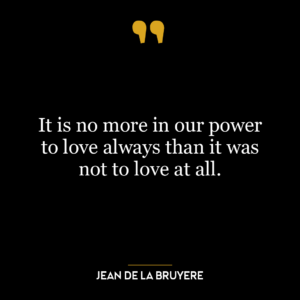This quote delves into the complex nature of human relationships and emotions. It suggests that we are more likely to feel affection for those who disdain us than for those who love us more than we desire. This might seem counterintuitive, but it reflects some deep-seated psychological tendencies.
The first part of the quote, "We are nearer loving those who hate us," might refer to the human tendency to seek approval and validation. When someone dislikes us, we might strive harder to win their affection, viewing their approval as a challenge or a validation of our worth. This could also be a manifestation of the desire to convert negativity into positivity, a common human trait.
The second part of the quote, "than those who love us more than we wish," highlights the discomfort and pressure that can come with excessive affection or attention. When someone loves us more than we desire, it can feel suffocating or overwhelming. It might also make us question our own feelings and whether we can reciprocate the same level of affection, leading to guilt or discomfort.
Applying this idea to today’s world or personal development, it encourages self-awareness and introspection in our relationships. It’s essential to understand our reactions to different types of affection and to recognize if we’re seeking approval in unhealthy ways or pushing away genuine love due to fear or discomfort. It also underlines the importance of balanced relationships, where love and affection are reciprocated equally.
In terms of personal development, it can serve as a reminder to not seek validation from those who do not value us. Instead, we should focus on nurturing relationships that are based on mutual respect and affection. It also emphasizes the importance of setting boundaries in relationships, to avoid feeling overwhelmed by excessive affection.
In conclusion, this quote is a nuanced exploration of human emotions and relationships, providing insights that are still relevant today.












